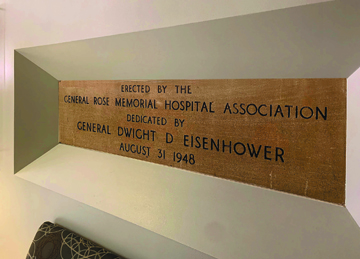by Chris DeGusto
The legacy of General Maurice Rose has been forever etched into the walls of Rose Medical Center. Aside from renaming the hospital after the WWII 3rd Armored Division commander 70 years ago, a new museum tucked into the lobby now boasts a stone fixture to signify the namesake’s dedication by General Dwight D. Eisenhower.

Marshall Fogel, author of Major General Maurice Rose, compared the relationship between Rose and Eisenhower to two other notable figures in American history.
“Grant was to Lincoln what Rose was to Eisenhower,” said Fogel of the former generals and U.S. presidents at Rose Medical Center’s 70th anniversary celebration in November.
Fogel was invited to speak at the commemoration and helped unveil “one of the most iconic paintings in WWII history,” according to the author. A 1948 painting of General Rose was restored and hung on display outside of the museum. Fogel told the Glendale Cherry Creek Chronicle that he came to the hospital with his parents when he was eight-years-old and saw that very same painting. His curiosity sparked, Fogel would turn six years of work into his biography of Rose.
“I always wondered about him. I said, ‘someday I’m going to find out,’” Fogel told the Chronicle. “The longer I researched him — which is hard because the records were difficult to find — the more I realized you can’t make this stuff up.”
Rose was killed in combat during the war, and at the time was the highest-ranking officer of Jewish background. The Rose Medical Center was built to “serve every need and every creed” and was the first hospital to hire a black doctor, Edmond Noel. Stories about Rose’s military prowess are innumerable, and Fogel said he finds it fitting that General Rose is side by side the hospital’s contributions to the community of all cultures and faith.
“From my heart, to revive the legacy of someone that important who was raised in Denver, who legitimately was a war hero and gave his life for his country, and the richness of the legacy of why they built this hospital to honor [Rose] has meant a lot to me,” said Fogel.
Kyle Wright, who helped Fogel construct his book, told the Chronicle that he met Fogel while working as a server, and that the two quickly became friends with similar interests.
“We would talk all the time, I would help him with computer stuff. One thing led to another and [Fogel] ended up showing me this giant portfolio he made of [General Rose’s] information. He asked me if I wanted to help him with it, and I jumped right into it,” said Wright.
The passion that Fogel exuded for Rose and his legacy was complimented at the ceremony by other speakers and those in attendance.
“Our goal is to remain in the same location and to serve this community and to uphold the values that were set forth when the hospital started,” said President and CEO of Rose Medical Center Ryan Tobin in an interview with the Chronicle. “I think we still live by those values today so our goal is to continue the mission.”

Rabbi Jeffrey Kaye spoke of the commitment to patients and families of Denver by following the examples of compassion and excellence set forth by Rose Medical Center visionaries. In her speech, Lt. Gov. Dianne Primavera officially declared Nov. 7 “The Power of Doing Right Day,” a tribute to the ceremony’s theme.
The life of Rose has inspired many, and the hospital has grown to be one of Denver’s most recognized. Rose Medical Center has been named among the nation’s top 100 hospitals by IBM Watson for 12 years in a row.
But the Rose Medical Center has not just garnished a reputation as a paramount hospital, but also as a workplace that feels like home.
One former member of the Rose Medical Center public relations team told the Chronicle that returning to the hospital to celebrate the 70th anniversary felt like a reunion.
“[Rose Medical Center] is really an important part of my life,” said Beverly Petry. “People who have worked here have always felt more like a family than just business colleagues. There’s something in the DNA of Rose. It’s really about the focus on patients and being collegial with doctors and that’s never changed.”
